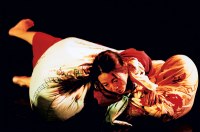Against the recent backdrop of a greatly altered commercial and consumer culture, Report on Body explored the often contradictory roles of Chinese women operating in the shadows of a male-dominated society and how their relationship to their bodies in the new capitalist China continues to be challenged and changed. Using dance, video, and performance gestures in a study of desire and the corresponding attachment of values—to sex, money, dreams, aspiration—the body becomes both the metaphor and the living embodiment of these commonalities.
Report on Body was presented as part of the Walker-organized exhibition How Latitudes Become Forms, which encompassed not only a visual and performative exhibition of art forms, but attempted to address in a holistic fashion the role of artists and their work in increasingly untenable global realities. In addition to their performances, Living Dance Studio held post performance talks with their audiences covering these topics, and also a panel discussion featuring theater artists and activists Rhodessa Jones and Juliana Pegues in which they discussed women’s issues through the lens of contemporary performance. . . .
Report on Body was presented as part of the Walker-organized exhibition How Latitudes Become Forms, which encompassed not only a visual and performative exhibition of art forms, but attempted to address in a holistic fashion the role of artists and their work in increasingly untenable global realities. In addition to their performances, Living Dance Studio held post performance talks with their audiences covering these topics, and also a panel discussion featuring theater artists and activists Rhodessa Jones and Juliana Pegues in which they discussed women’s issues through the lens of contemporary performance. . . .
Artists' Statement
"We use “body” as a key word, to observe the value driven to the body in our present lives and situation. The body in this work constitutes a channel through which we can concretely, and in detail, experience the deepest transformations concerning such things as the value we attach to money, our dreams, fashion, sex, our aspirations. “Body” has become a metaphor for our common customs and desires."—Wen Hui and Wu Wenguang
Media
Related Links & Events
Biographical Information
Wu Wenguang (Chinese, b. 1956) and Wen Hui (Chinese, b. 1960)
Experimental choreographer Wen Hui and pioneer filmmaker Wu Wenguang formed Living Dance Studio in Beijing in 1994. They create multimedia works that document intimate acts of life in modern China, with a particular focus on the everyday activities of women: folding clothes, washing hair, making...
Experimental choreographer Wen Hui and pioneer filmmaker Wu Wenguang formed Living Dance Studio in Beijing in 1994. They create multimedia works that document intimate acts of life in modern China, with a particular focus on the everyday activities of women: folding clothes, washing hair, making...





